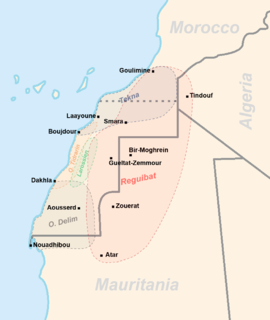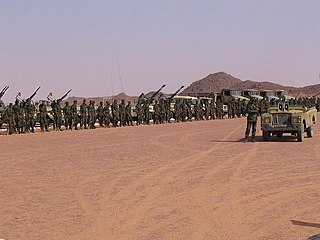| |||||
| Decades: | |||||
|---|---|---|---|---|---|
| See also: | |||||
The following lists events that happened during 1975 in Spanish Sahara .
| |||||
| Decades: | |||||
|---|---|---|---|---|---|
| See also: | |||||
The following lists events that happened during 1975 in Spanish Sahara .

Western Sahara is a disputed territory on the northwest coast and in the Maghreb region of North and West Africa. About 20% of the territory is controlled by the self-proclaimed Sahrawi Arab Democratic Republic, while the remaining 80% of the territory is occupied and administered by neighboring Morocco. Its surface area amounts to 266,000 square kilometres (103,000 sq mi). It is one of the most sparsely populated territories in the world, mainly consisting of desert flatlands. The population is estimated at just over 500,000, of which nearly 40% live in Laayoune, the largest city in Western Sahara.
The history of Western Sahara can be traced back to the times of Carthaginian explorer Hanno the Navigator in the 5th century BC. Though few historical records are left from that period, Western Sahara's modern history has its roots linked to some nomadic groups such as the Sanhaja group, and the introduction of Islam and the Arabic language at the end of the 8th century AD.

The Polisario Front, Frente Polisario, FRELISARIO or simply POLISARIO, from the Spanish abbreviation of Frente Popular de Liberación de Saguía el Hamra y Río de Oro, is a Sahrawi rebel national liberation movement aiming to end Moroccan presence in the Western Sahara. It is a consultative member of the Socialist International. The United Nations considers the Polisario Front to be the legitimate representative of the Sahrawi people and maintains that the Sahrawis have a right to self-determination. The Polisario Front is outlawed in the parts of Western Sahara under Moroccan control, and it is illegal to raise its party flag there.

Hassan II ; 9 July 1929 – 23 July 1999) was King of Morocco from 1961 until his death in 1999. He was a member of the Alaouite dynasty. He was the eldest son of Mohammed V, Sultan, then King of Morocco (1909–1961), and his second wife, Lalla Abla bint Tahar (1909–1992). Hassan was known to be one of the most severe rulers of Morocco, widely accused of authoritarian practices and of being an autocrat and a dictator, particularly during the Years of Lead.

The Sahrawi, or Saharawi people, is a media term and a political term denoting the population of the western part of the Sahara desert which includes Western Sahara, southern Morocco, much of Mauritania and the extreme southwest of Algeria. In reality there is no specific "Sahrawi" ethnicity or language.

Spanish Sahara, officially the Province of the Sahara between 1958 and 1976, was the name used for the modern territory of Western Sahara when it was occupied and ruled by Spain between 1884 and 1976. It had been one of the most recent acquisitions of the Spanish Empire as well as one of its last remaining holdings, which had once extended from the Americas to the Spanish East Indies.

The Green March was a strategic mass demonstration in November 1975, coordinated by the Moroccan government, to force Spain to hand over the disputed, autonomous semi-metropolitan province of Spanish Sahara to Morocco. The demonstration of some 350,000 Moroccans advanced several kilometres into the Western Sahara territory, escorted by nearly 20,000 Moroccan troops, and meeting very little response from the Sahrawi Polisario Front. Nevertheless, the events quickly escalated into a fully waged war between Morocco and the militias of the Polisario, the Western Sahara War, which would last for 16 years. Morocco later gained control over most of the former Spanish Sahara, which it continues to hold.

The Madrid Accords, also called Madrid Agreement or Madrid Pact, was a treaty between Spain, Morocco, and Mauritania to end the Spanish presence in the territory of Spanish Sahara, which was until the Madrid Accords' inception a Spanish province and former colony. It was signed in Madrid on November 14, 1975, six days before Franco died, although it was never published on the Boletin Oficial del Estado. This agreement was in conflict with the Law on decolonization of Sahara, ratified by the Spanish Parliament (Cortes) on November 18. In cause of the Madrid agreement, the territory would then be divided between Morocco and Mauritania.

The following events occurred in November 1975:

The International Court of Justice Advisory Opinion on Western Sahara was a 1975 advisory, non-binding opinion by the International Court of Justice (ICJ) of two questions presented to it by the UN General Assembly under Resolution 3292 regarding the disputed territory of Western Sahara. In 1969, Spain returned the region of Ifni to Morocco.
The Houston Agreement was the result of negotiations between the Polisario Front and Morocco on the organization of a referendum, which would constitute an expression of self-determination for the people of Western Sahara, possibly leading to full independence or integration within Morocco. The talks were conducted during 1997 in Houston, United States, under the auspices of United Nations representative James Baker, using the framework of the 1991 Settlement Plan. The agreement was supposed to lead to a referendum in 1998, after it had been prevented from taking place in 1992 as originally envisioned.

The Settlement Plan was an agreement between the ethnically Saharawi Polisario Front and Morocco on the organization of a referendum, which would constitute an expression of self-determination for the people of Western Sahara, leading either to full independence, or integration with the Kingdom of Morocco. It resulted in a cease-fire which remains effective to this day, and the establishment of the MINURSO peace force to oversee it and to organize the referendum. The referendum never occurred.

To assist in the decolonization process of the Spanish Sahara, a colony in North Africa, the United Nations General Assembly in 1975 dispatched a visiting mission to the territory and the surrounding countries, in accordance with its resolution 3292.

The Western Sahara conflict is an ongoing conflict between the Polisario Front and the Kingdom of Morocco. The conflict originated from an insurgency by the Polisario Front against Spanish colonial forces from 1973 to 1975 and the subsequent Western Sahara War against Morocco between 1975 and 1991. Today the conflict is dominated by unarmed civil campaigns of the Polisario Front and their self-proclaimed SADR state to gain fully recognized independence for Western Sahara.

Khalihenna Ould Errachid is the Sahrawi chairman of the Royal Advisory Council for Saharan Affairs (CORCAS), a Moroccan government body active in the non-self-governing territory of Western Sahara.

The Western Sahara Autonomy Proposal is an initiative, proposed by Morocco in 2006 as a possible solution to the Western Sahara conflict. In 2006 the Moroccan Royal Advisory Council for Saharan Affairs (CORCAS) proposed a plan for the autonomy of Western Sahara and made visits to a number of countries to explain the proposal. The Spanish approach to regional autonomy has been named as a possible model for Western Saharan autonomy, mentioning specifically the cases of the Canary Islands, the Basque Country, Andalusia or Catalonia. The plan was presented to the UN Security Council in April 2007, and has received the backing of the USA and France. This initiative constitutes the main ground for the Moroccan proposal at Manhasset negotiations.

The Western Sahara War was an armed struggle opposing the Sahrawi indigenous Polisario Front to Morocco between 1975 and 1991 and Mauritania from 1975 to 1979, being the most significant phase of the Western Sahara conflict. The conflict erupted after the withdrawal of Spain from the Spanish Sahara in accordance with the Madrid Accords, by which it transferred administrative control of the territory to Morocco and Mauritania, but not sovereignty. In late 1975, the Moroccan government organized the Green March of some 350,000 Moroccan citizens, escorted by around 20,000 troops, who entered Western Sahara, trying to establish a Moroccan presence. While at first met with just minor resistance by the POLISARIO, Morocco later engaged a long period of guerrilla warfare with the Sahrawi nationalists. During the late 1970s, the Polisario Front, desiring to establish an independent state in the territory, attempted to fight both Mauritania and Morocco. In 1979, Mauritania withdrew from the conflict after signing a peace treaty with the POLISARIO. The war continued in low intensity throughout the 1980s, though Morocco made several attempts to take the upper hand in 1989–1991. A cease-fire agreement was finally reached between the Polisario Front and Morocco in September 1991. Some sources put the final death toll between 10,000 and 20,000 people.
In the 1970s in Morocco, after two coup attempts in 1971 and 1972, the patriotism engendered by Morocco’s participation in the Middle East conflict and by the events in Western Sahara contributed to Hassan's popularity and strengthened his hand politically despite serious domestic turmoil. The king had dispatched Moroccan troops to the Sinai front after the outbreak of Arab-Israeli War in October 1973. Although they arrived too late to engage in hostilities, the action won Morocco goodwill among other Arab states. Shortly thereafter, the attention of the government turned to the annexation of then Spanish Sahara from Spain, an issue on which all major domestic parties agreed.
The following lists events that happened during 1975 in the Kingdom of Morocco.

Moroccan settlers refers to citizens of the Kingdom of Morocco of various ethnicities that have settled in Western Sahara. Following the 1975 Green March, on the course of Western Sahara conflict, the Moroccan state has sponsored settlement schemes enticing thousands of Moroccans to move into the Moroccan-occupied part of Western Sahara. By 2015, it was estimated that Moroccan settlers made up at least two thirds of the 500,000 inhabitants in the Western Sahara region.
| This year in Africa article is a stub. You can help Wikipedia by expanding it. |
| This Western Sahara article is a stub. You can help Wikipedia by expanding it. |